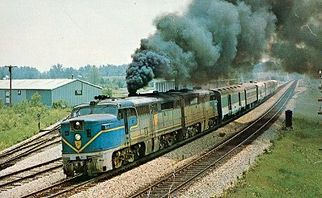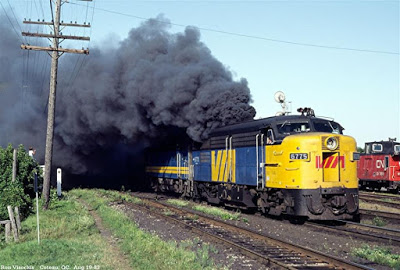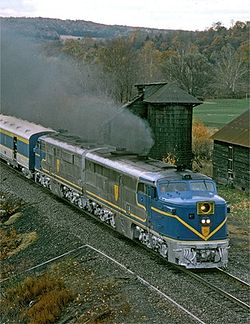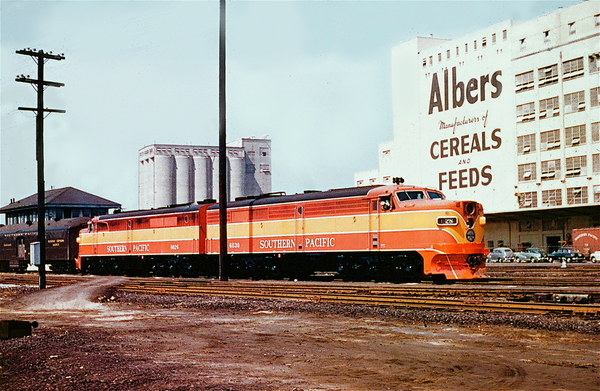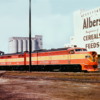Alco PAs smoked so much they were called honorary steam engines. The new Lionel version, just out, lives up to that reputation.
Replies sorted oldest to newest
Nailed It! ![]()

Love the photo RSJB! Still waiting for Lionel to figure out how to make the smoke black!
Pete...that is impressive!!
Great shots Hancock. Apparently the reason the PAs were short-lived was that the engine Alco designed for them was a bit of a lemon. The sound set Lionel put in them is very different from last year's E8s. Actually sounds like the engine is not feeling too well!
Attachments
The Alco PAs and a lot of other Alcos of that era, were powered by the Alco 244 prime mover, released in 1944. It was used in a lot of Alco diesels and while it was not as good as the EMD design of the era, I think it's a bit of a stretch to call it a "lemon." Thousands of 244's served long and well for many years in Alco products. There are still a handful of them running today. In 1951, Alco came out with their 251 prime mover, which was a MUCH better design than the old 244.
One of the 244's problems, and the problem which caused all the smoke, was "turbo lag." Like most turbos, the Alco turbocharger was driven solely by the exhaust gas stream. When the throttle was notched up quickly, the governor and fuel rack instantly delivered the higher fuel delivery rate called for by the higher throttle position, but the turbo was not spinning fast enough to deliver enough air to properly burn all the fuel. The turbo would "lag" the throttle change by several seconds as it spooled up. It was during this time that the Alco 244 could deliver prodigious amounts of smoke!
By contrast, the EMD 567 diesel of that era did not suffer from this problem because it had a different design. Because the EMD diesel was a 2-cycle design, all of them were supercharged via a gear-driven Roots blower. However, in the turbo models, the turbocharger was also gear driven! In throttle positions 1 through 5, the gear driven turbo kept pace with the fuel delivery and didn't lag a throttle position change. In an ingenious bit of design work, the turbo was driven through those gears via an over-running clutch. Once the throttle hit Run 6 and above, the exhaust gas stream could spin the turbo faster than the gear train could, and the over-running clutch allowed that to happen. This is why you don't see turbo lag smoke from an EMD...even an old EMD.
My apologies Rich! I know next to nothing (or actually nothing!) about real Diesel engines. Thanks for the very interesting info. I’ve heard about smoking Alcos for years but never before heard why they smoked as they did.
JamesRx posted:Love the photo RSJB! Still waiting for Lionel to figure out how to make the smoke black!
Easy. Just defy the laws of physics and chemistry.
Interesting thread.
Rich, great explanation too.
Rich Melvin posted:The Alco PAs and a lot of other Alcos of that era, were powered by the Alco 244 prime mover, released in 1944. It was used in a lot of Alco diesels and while it was not as good as the EMD design of the era, I think it's a bit of a stretch to call it a "lemon." Thousands of 244's served long and well for many years in Alco products. There are still a handful of them running today. In 1951, Alco came out with their 251 prime mover, which was a MUCH better design than the old 244.
One of the 244's problems, and the problem which caused all the smoke, was "turbo lag." Like most turbos, the Alco turbocharger was driven solely by the exhaust gas stream. When the throttle was notched up quickly, the governor and fuel rack instantly delivered the higher fuel delivery rate called for by the higher throttle position, but the turbo was not spinning fast enough to deliver enough air to properly burn all the fuel. The turbo would "lag" the throttle change by several seconds as it spooled up. It was during this time that the Alco 244 could deliver prodigious amounts of smoke
Yes - and one of the things I prefer about Alco P's and F's vis-a-vis EMD E's and F's (besides the better looks of the Alcos) is the sound. An Alco 4-cycle prime mover has an almost casual, "Relax - I got this" sound about it, as compared to the EMD 2-cycle "all wound up" sound.
Of course, all that I just typed is irrelevant, purely foamer rail fan talk - but it's fun.
Me - I tend to prefer my locos with 2 or 3 or 4 (or 6!) cylinders and a big horizontal boiler on top, anyway.
scale rail posted:
You gave me a framed copy of this photo for my birthday one year. It's hanging in our spare bedroom. Matt
Great info Rich! Falcon70
Rich Melvin posted:The Alco PAs and a lot of other Alcos of that era, were powered by the Alco 244 prime mover, released in 1944. It was used in a lot of Alco diesels and while it was not as good as the EMD design of the era, I think it's a bit of a stretch to call it a "lemon." Thousands of 244's served long and well for many years in Alco products.
Thank you, Rich. Railfans need to hear factual information about the 244.
Those who actually experienced 244-powered Alco-GE locomotives in service on Class I railroads saw them working hard and reliably, on the roads which gave them good maintenance. Santa Fe's PA1/PB1 "lemons" pulled trains on a 2200 mile route at 100 MPH (later 90 MPH), for over 20 years, with very few road failures. Southern Pacific assigned its Alco-GE passenger "lemons" to its routes with the worst mountain grades. Spokane, Portland & Seattle, as well as Delaware & Hudson, successfully relied on their fleets of "lemons" powered by the Alco 244 diesel engine.
The self-appointed Alco experts got their (mis)information from reading, not from experience. Authoritative writing which is critical of Alco-GE 244-powered locomotives and backed up with numbers, is not to be found. The early turbocharger and crankshaft issues certainly happened, but were successfully addressed by 1950, and thereafter, Alco-GE's were capable of reliable service.
True, the maintenance costs were higher, but much of the maintenance was for small things such as oil leaks, and more shop time was required to perform many of the same maintenance tasks that could be done in a shorter time on EMDs. The EMD diesel engine was in a class by itself, but that does not make the Alco 244 a pariah.
The splendid, but complex, General Electric Amplidyne excitation system was responsible for much of the heavy smoke. Alco-GE's with well-tuned Amplidyne equipment typically emitted only moderate smoke.
Back to the actual topic of the thread: Lionel's Legacy PA's can certainly smoke. It's impressive.
Tom, you are a guy who has definitely "Been there. Done that." when it comes to Alcos and the old 244 engines. The Santa Fe fleet of PAs were arguably the most beautiful cab-unit diesels ever made. And their record of service at high speed over thousands of miles is an enviable legacy.
Thanks for contributing to this thread.
Lack of maintenance causes many more problems in the long run. Accountants who know nothing of how machines work like to save short term money by deferring maintenance, but that never works in the long term.
I used to repair machines for the semiconductor industry that were very fussy and maintenance intensive, and most customers gave them little attention until they broke down. Some customers maintained them regularly and theirs hardly ever broke down.
It's a lot about how well you know and care for your machine.







